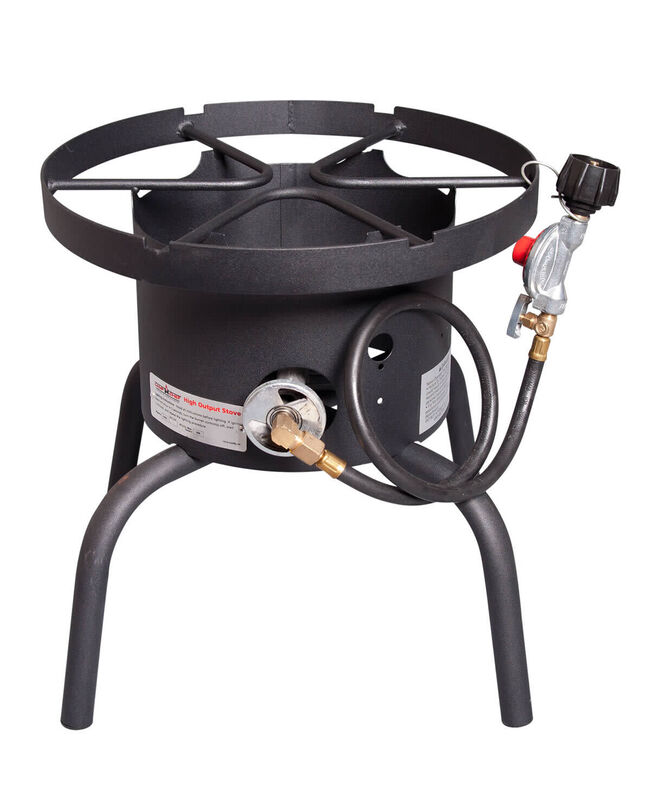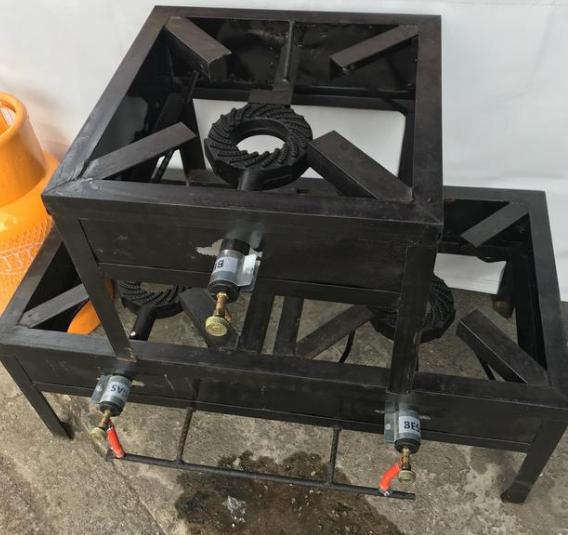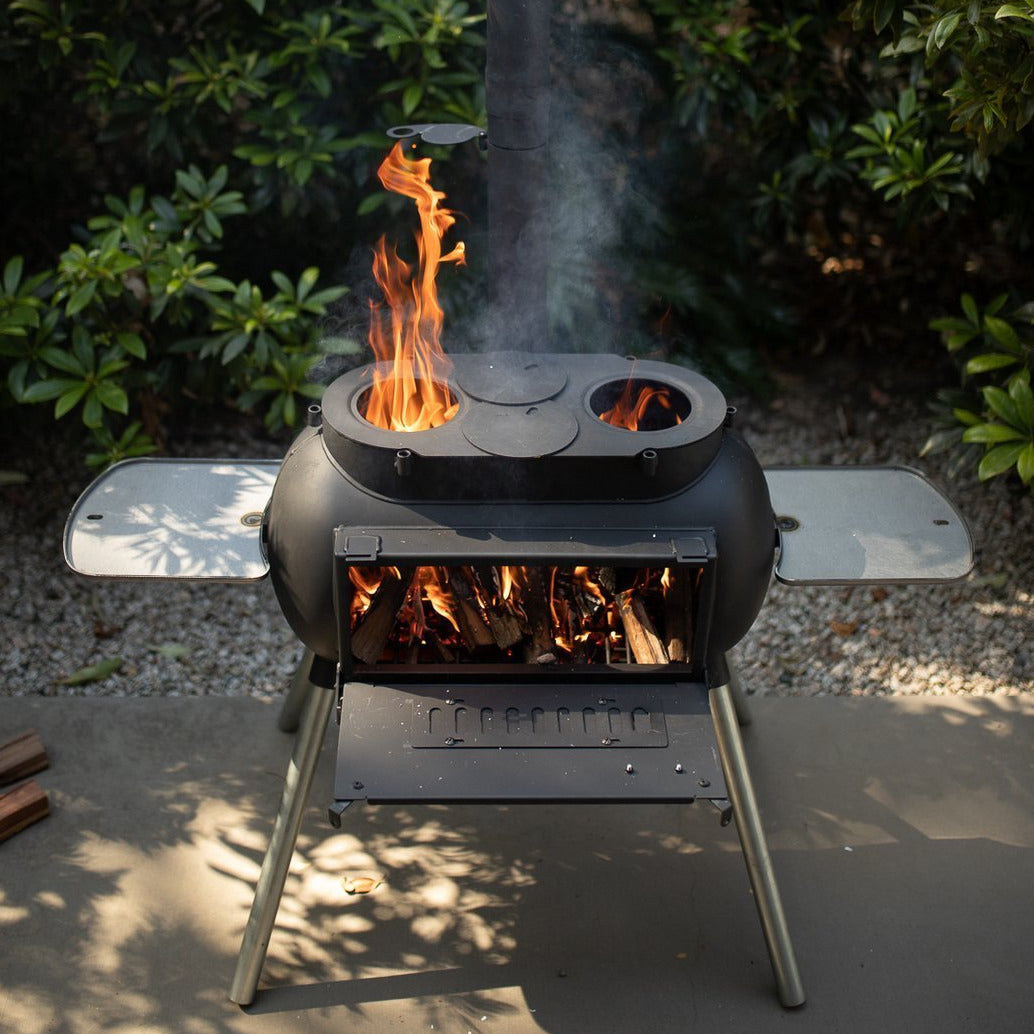Unlocking the Art of Outdoor Cooking: A Comprehensive Guide to Outdoor Cookers
Outdoor cooking is a culinary experience that takes place in the great outdoors, whether in your backyard, at a campsite, or on a hiking trail. It involves preparing and enjoying delicious meals using various cooking methods like grilling, smoking, and campfire cooking. Outdoor cooking offers a unique blend of smoky flavors, social bonding, and a connection to nature, making it a cherished and satisfying pastime for food enthusiasts and nature lovers alike. It's an opportunity to explore diverse recipes, experiment with different techniques, and create lasting memories in the open air.
Tips for Successful Outdoor Cooking.

Outdoor cooking has a magnetic allure that transcends generations and cultures. There's something inherently primal and satisfying about preparing and enjoying a meal in the great outdoors, whether it's in your backyard, at a campsite, or by the beach. One essential tool that makes this experience possible and enjoyable is the outdoor cooker. In this comprehensive guide, we will delve deep into the world of outdoor cookers, exploring their types, advantages, and how to make the most of them.
The Diverse World of Outdoor Cookers
Outdoor cookers come in various shapes and sizes, catering to different preferences and cooking needs. Here are some of the most common types:
a. Charcoal Grills: Charcoal grills are iconic for their smoky flavor and versatility. They use charcoal as the primary heat source, and the heat can be controlled by adjusting the airflow through vents. Charcoal grills are excellent for searing steaks, slow-cooking ribs, or even baking pizzas. The ritual of lighting charcoal and tending to the fire is cherished by many barbecue enthusiasts.
b. Gas Grills: Gas grills are known for their convenience. They run on propane or natural gas and are quick to start, making them perfect for those spontaneous outdoor cookouts. The ability to control the flame with precision allows for even cooking and quick temperature adjustments. Gas grills are suitable for a wide range of foods, from burgers and hot dogs to vegetables and delicate seafood.
c. Pellet Grills: Pellet grills are a relatively newer addition to the outdoor cooking scene, but they have gained popularity for their versatility. These grills use hardwood pellets as fuel, providing a unique smoky flavor. They are known for their precise temperature control, which makes them ideal for slow-cooking and smoking meats. Pellet grills have a digital interface that allows users to set and forget their cooking temperatures, making them a favorite among busy grillmasters.
d. Smokers: Smokers are designed explicitly for low-and-slow cooking. They come in various configurations, including offset smokers, vertical water smokers, and electric smokers. Smoking involves cooking food at low temperatures for extended periods, allowing it to absorb smoky flavors and become incredibly tender. Smoking is popular for foods like brisket, ribs, and pulled pork.
e. Camp Stoves: Camp stoves are a must-have for outdoor enthusiasts, whether they are camping in the wilderness or having a picnic in the park. These compact stoves are portable and easy to use, running on various fuels like propane, butane, or even wood. They are perfect for boiling water, frying, and preparing simple meals on the go.

Benefits of Outdoor Cooking
Outdoor cooking offers a multitude of benefits that make it a popular and enjoyable culinary activity for people of all ages. Here are some of the key advantages of outdoor cooking:
- Enhanced Flavor: Cooking outdoors, especially over an open flame, imparts a unique and delicious smoky flavor to food that's difficult to replicate indoors. This added dimension enhances the taste of grilled and smoked dishes.
- Social Experience: Outdoor cooking often brings people together, whether it's a backyard barbecue, a camping trip, or a picnic. It fosters social interaction, encourages bonding, and provides an opportunity to spend quality time with family and friends.
- Versatility: Outdoor cooking equipment comes in various forms, including grills, smokers, camp stoves, and more. This diversity allows for a wide range of cooking methods, from grilling and smoking to roasting and baking, giving you the flexibility to prepare a variety of dishes.
- Healthier Cooking: Outdoor cooking tends to use less added fat and oil. Grilling, for instance, allows excess fat to drip away from the food, resulting in meals that are lower in calories and healthier.
- Stress Reduction: Cooking outdoors, surrounded by nature, can be therapeutic and stress-reducing. The act of tending to a fire, watching the flames dance, and enjoying the natural surroundings can promote relaxation and well-being.
- Exploration and Creativity: Outdoor cooking encourages experimentation with recipes and techniques. It provides an opportunity to explore different flavors, ingredients, and cooking methods, fostering culinary creativity.
- Connection with Nature: Preparing food outdoors allows you to connect with nature and appreciate the beauty of your outdoor surroundings. It can be a way to learn about local ecosystems and the resources nature provides.
- Camping and Adventure: Outdoor cooking is an essential part of camping and other outdoor adventures. It enables you to prepare meals in remote locations where traditional kitchen facilities are not available, enhancing the adventure.
- Cultural and Traditional Practices: Outdoor cooking often plays a significant role in cultural and traditional practices. It allows individuals and communities to preserve culinary heritage, share traditional recipes, and pass down cooking traditions to future generations.
- Reduced Energy Costs: Cooking outdoors can lead to reduced energy consumption, as it eliminates the need for electricity or gas to power indoor stoves and ovens. This can be a cost-effective option, particularly in fair weather.
- Sustainability: With responsible choices in fuel sources and cookware, outdoor cooking can be eco-friendly. Sustainable practices such as using renewable fuel sources and minimizing waste can reduce its environmental impact.
- Educational Value: Outdoor cooking provides an educational opportunity, teaching outdoor skills, fire safety, and basic culinary techniques. It can be an enjoyable way for children and adults to learn about self-sufficiency and outdoor survival skills.
Tips for Successful Outdoor Cooking
To master the art of outdoor cooking, consider the following tips:
a. Preheat and Season: Preheat your outdoor cooker to the desired temperature before placing food on the grates. Season your food with spices, herbs, and marinades to enhance flavor.
b. Proper Heat Control: Learn to control the heat of your outdoor cooker. Use indirect heat for slow cooking and smoking and direct heat for searing and grilling. Understanding your cooker's hot spots and cool zones is crucial.
c. Use the Right Tools: Invest in good-quality grilling and cooking utensils. Tongs, grill brushes, thermometers, and basting brushes are essential for successful outdoor cooking.
d. Safety First: Always prioritize safety when cooking outdoors. Keep a fire extinguisher nearby, and never leave a hot cooker unattended. Follow all safety guidelines, especially in fire-prone areas.
e. Experiment and Have Fun: Don't be afraid to experiment with different recipes and techniques. Outdoor cooking is as much about the journey as it is about the destination. Enjoy the process and have fun.

Advantages of Outdoor Cooking
- Enhanced Flavor: Outdoor cookers, particularly those that use charcoal, wood, or pellets, impart a unique smoky flavor to food, enhancing its taste and appeal.
- Social Experience: Outdoor cooking is a communal activity that brings people together. It encourages bonding, conversation, and quality time with friends and family.
- Versatility: Different types of outdoor cookers allow for a wide range of cooking methods. You can grill, smoke, bake, roast, and more, offering flexibility in your culinary creations.
- Healthier Cooking: Outdoor cooking often involves less added fat and oil, as excess fat drips away from the food. This can lead to healthier meal options.
- Stress Reduction: Being outdoors, engaged in the cooking process, and enjoying natural surroundings can have a therapeutic effect, reducing stress and promoting relaxation.
- Exploration and Creativity: Outdoor cooking encourages experimentation with recipes and techniques, providing a platform for culinary creativity and exploration.
- Connection with Nature: Cooking outdoors allows you to connect with nature, appreciating the beauty of outdoor settings and learning to use natural resources effectively.
- Camping and Adventure: Outdoor cookers are essential for camping and other outdoor activities, enabling you to prepare meals in remote locations.
- Cultural and Traditional Practices: Outdoor cooking often plays a significant role in cultural and traditional practices, preserving culinary heritage.
Disadvantages of Outdoor Cooking
- Weather Dependency: Outdoor cooking is heavily influenced by weather conditions. Rain, wind, extreme heat, or cold can make it challenging to cook effectively.
- Setup and Cleanup: Outdoor cookers require more setup and cleanup than indoor kitchens. Preparing and maintaining a fire or grill can be time-consuming, and cleaning the equipment can be labor-intensive.
- Inconsistent Cooking: Achieving consistent cooking temperatures can be challenging, especially with open flames and grills. This may result in unevenly cooked food.
- Safety Concerns: Outdoor cooking carries inherent safety risks, including fire hazards, burns, and accidents. Adequate precautions are necessary to mitigate these risks.
- Limited Cooking Space: Outdoor cookers typically offer limited cooking space compared to indoor kitchens, which may restrict your ability to prepare large quantities of food or complex meals.
- Fuel Costs: Depending on the type of cooker, fuel costs can add up over time. Charcoal, wood pellets, and propane can be expensive, especially for frequent use.
- Learning Curve: Using outdoor cookers effectively may require a learning curve. Understanding temperature control, managing fire or heat sources, and mastering various cooking techniques can take time and practice.
- Environmental Impact: Some outdoor cooking methods may contribute to environmental concerns. For example, charcoal grills and smokers release carbon emissions into the air, and improper disposal of ashes can be harmful to the environment.
- Space Limitations: If you live in a small apartment or have limited outdoor space, using certain outdoor cookers may not be practical

Outdoor Cooking and Sustainability
Outdoor cooking can be sustainable if done responsibly. Consider these eco-friendly practices:
a. Fuel Choices: Opt for sustainable fuel sources like natural lump charcoal, which is made from renewable hardwood, or use clean-burning propane or natural gas. Avoid charcoal briquettes with additives.
b. Minimize Waste: Reduce waste by using reusable grilling tools and avoiding disposable plates and utensils. Choose eco-friendly cleaning products for your outdoor cooker.
c. Eco-Friendly Recipes: Explore plant-based and sustainably sourced food options for your outdoor cooking adventures. Grilled vegetables and meat alternatives like tofu can be delicious and environmentally friendly.
Cleaning and Maintenance
Proper maintenance of your outdoor cooker is essential for its longevity. Here's how to keep it in top condition:
a. Regular Cleaning: Clean your cooker after each use to prevent grease buildup and food residue. Scrape the grates and remove ash or debris.
b. Seasoning: For smokers and cast-iron grills, consider seasoning them periodically with cooking oil to prevent rust and maintain their non-stick properties.
c. Cover It: When not in use, cover your outdoor cooker to protect it from the elements. A cover will shield it from rain, snow, and UV rays.
Outdoor cooking is not just about preparing a meal; it's about embracing an experience that connects us to nature and to each other. Whether you're a seasoned pitmaster, a weekend griller, or a camping enthusiast, the right outdoor cooker can transform your outdoor culinary adventures. From charcoal grills to pellet smokers, there's a tool to suit every taste and preference. With the right equipment and a little knowledge, you can unlock the full potential of outdoor cooking, creating flavorful dishes and cherished memories in the process. So, fire up your outdoor cooker, gather your loved ones, and savor the delicious journey of outdoor culinary exploration.



